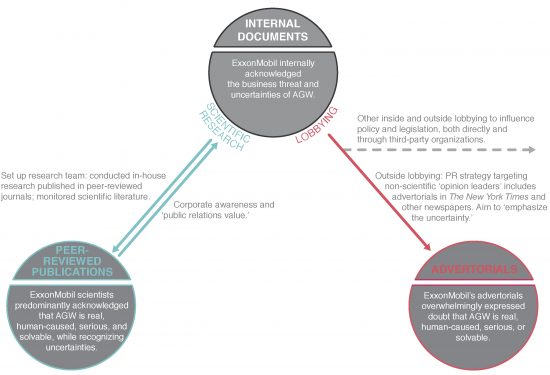August 27, 2017 – Why would an energy company dealing largely with fossil fuel exploration, extraction and processing want to mislead the world about climate change? Could it be that profit trumped environmental responsibility? Could it be that shareholder value and board of director and executive bonuses were more important than the truth?
In an empirically peer-reviewed paper published in IOP Science this last week Geoffrey Supran and Naomi Oreskes, of Harvard University, studied 187 climate communications from ExxonMobil Corporation, the company that was recently headed up by Rex Tillerson, the current U.S. Secretary of State. In their analysis, the researchers look at those within the company describing their position on whether climate change is “real, human-caused, serious, and solvable.”
Based on these four criteria what the researchers discovered was the watering down of climate change message, casting doubt, the closer the communication came to be open and public.
Here are some interesting statistics from the analysis:
- 83% of peer-reviewed papers produced by ExxonMobil staff acknowledged that climate change was real and human caused
- 80% of internal documents from ExxonMobil also stated that climate change was real and human caused
- But 81% of advertorials produced by the company expressed doubt about climate change and a human causal link
- And 24 internal documents analyzed the risk to ExxonMobil of stranded fossil fuel assets
- No advertorials described any risk to ExxonMobil’s fossil fuel assets.
The conclusion based on these statistics is undeniable. The management of ExxonMobil deliberately misled the public while its internal scientists contributed to academic publications on climate change and its human cause. Could one describe ExxonMobil’s executive suite as being anything more than duplicitous?
ExxonMobil faces charges of racketeering and deceiving of consumers and investors through their external communications. Attorneys General in 17 American states and territories plus the U.S. Securities and Exchange Commission (SEC) have begun an investigation to reveal the deception with issued subpoenas to ExxonMobil executives, alleging the company’s accounting of climate risk “may be a sham.”
In response to these allegations and subpoenas, ExxonMobil has responded stating, “We unequivocally reject allegations that ExxonMobil suppressed climate change research contained in media reports that are inaccurate distortions of ExxonMobil’s nearly 40-year history of climate research. We understand that climate risks are real. The company has continuously, publicly and openly researched and discussed the risks of climate change, carbon life cycle analysis, and emissions reductions.” The company further states that the attorneys general and SEC are “cherry-picking” the internal communications to create their case.
Waith an open invitation to study ExxonMobil’s documents, Supran and Oreskes took up the challenge concentratin on the internal and external communications made available in an on-line database. They specifically looked at content to determine whether it was designed to dissuade officials from action and build public opinion doubt about anthropogenic climate change.
The documents studied included:
- 32 internal documents published between 1977 and 1995,
- 72 peer-reviewed scientific papers of which 53 appeared in academic journals
- 47 non-peer reviewed papers
- 36 advertorials
Supran and Oreskes applied rigor to their analysis. For documents published 1990 or prior they exempted any expression of doubts about anthropogenic climate change described. After 1990 and the first Intergovernmental Panel on Climate Change (IPCC) report indicating scientific consensus regarding the human causal link to global warming, Supran and Oreskes assigned to ExxonMobil communications such attributes as deception, denial, confirmation and complicity.
In the paper the authors provide excerpts from internal, peer and non-peer reviewed, and advertorial publications produced by ExxonMobil over a range of dates from 1979 to 2008. In one 1979 internally distributed document, staff write,
“The most widely held theory is that:—The increase [in atmospheric CO2] is due to fossil fuel combustion;—Increasing CO2 concentration will cause a warming of the earth’s surface;—The present trend of fossil fuel consumption will cause dramatic environmental effects before the year 2050.”
So the company is already engaged in assessing CO2 and its role in climate change.
Three years later another internal document states,
“The question of which predictions and which models best simulate a carbon dioxide induced climate change is still being debated by the scientific community. Our best estimate is that doubling of the current concentration could increase average global temperature by about 1.3° to 3.1 °C….”
Twelve years later in 1995, in a peer-reviewed paper, ExxonMobil scientists propose geoengineering to limit climate change stating the following,
“We present a preliminary analysis of a geoengineering option based on the intentional increase of ocean alkalinity to enhance marine storage of atmospheric CO2.”
A year later in a non-peer reviewed paper, an ExxonMobil writer asks the question: “Global warming, who’s right?” and goes on to describe anthropogenic warming as an “unproven theory.”
And as late as 2008 in a non-peer reviewed paper, an ExxonMobil writer denies any direct connection between greenhouse gas emissions from the oil and natural industry, “and the phenomenon commonly referred to as climate change.”
In advertorial content produced by ExxonMobil, the denial of fossil fuel industry complicity in anthropogenic global warming is remarkable. Here are two quotes from separate advertorials published in 1997. The first states,
“Let’s face it: The science of climate change is too uncertain to mandate a plan of action that could plunge economies into turmoil…Scientists cannot predict with certainty if temperatures will increase, by how much and where changes will occur. We still don’t know what role man-made greenhouse gases might play in warming the planet.”
The second is very much of the same ilk and states,
“There is a high degree of uncertainty over the timing and magnitude of the potential impacts that man-made emissions of greenhouse gases have on climate.”
Consider that both of these public statements occur 18 years after ExxonMobil’s own scientists circulated internal documents that conclusively linked their industry to global warming.
As for stranded assets, that is, the leaving of oil and natural gas in the ground, an internal 1979 circulated document states that CO2 and dramatic climate change are linked and concludes,
“Should it be deemed necessary to maintain atmospheric CO2 levels to prevent significant climatic changes, dramatic changes in patterns of energy use would be required. World fossil fuel resources other than oil and gas could never be used to an appreciable extent…Removal of CO2 from flue gases does not appear practical due to economics and lack of reasonable disposal methods. If it becomes necessary to limit future CO2 emissions without practical removal/disposal methods, coal and possibly other fossil fuel resources could not be utilized to an appreciable extent.”
But nowhere in any ExxonMobil annual report dating back to 1979 is there any hint of risk to the company’s assets. No shareholders are given the scoop. And the public at large remains unaware of what ExxonMobil already knows.
It should, therefore, not be a surprise that Supran and Oreskes conclude that ExxonMobil misled non-scientific audiences about climate science while studying climate change internally and reporting results in peer-reviewed journals.
It’s almost schizophrenic, this two-headed monster that ExxonMobil created, one steeped in science and the other in deception. One can guess that as the scientists’ research reached the extreme altitudes of corporate head office and its marketing division, facts were suppressed or whitewashed to make them more palatable to shareholders’ profit expectations.
The scientists at ExxonMobil weren’t actually restricted from publishing what they found out about anthropogenic causes of global warming and the role the company was playing in the problem. But the audiences that read these published studies were limited to academics and readers of limited circulation science and engineering journals.
And as for advertorial content, all one can say is that ExxonMobil blatantly lied to its largest reading audience. Advertorials were bought and paid for to give prominence to a message of uncertainty. Sponsored content appeared within the pages of American mass media such as the New York Times, Los Angeles Times, Wall Street Journal, and the Washington Post to name just a few.











Luigi Antonio Pezone Publications on the good intentions of Exxon scientists and other world scientists do nothing to help. What is serious is the silence about the solutions. World science is losing itself in a big glass of water while the Nobel prizes look only in the direction of their specializations. They did not spend a single word in favor of or against the interactive water and air systems published at http://www.SPAWHE.eu, without public or private funds, but only on the basis of the experience and reasoning of a pensioner who Has considered it opportune to change the majority of the energy, purification and management systems of water and air. Today’s current energy and purification plants do not exploit the synergies between water, air, gravitational forces, pressures, physical and chemical principles that, instead, interfere perfectly, to produce energy, purification and hydraulic lifting without other energy sources. https://uploads.disquscdn.com/images/da3d83630c5c70aac7f16e17f5e65249a056fcadc05bde5a566427ae70a27958.jpg
Hi Luigi, I’m not sure why you have chosen this particular posting to promote a technology that you are offering as a game changer. If you wish to write a guest posting to this site I would be happy to review it and consider its merits for publication.
I think that in the field of environment and energy only false information circulates, because it is very difficult to admit that everything has been wrong since the advent of the industrial era. Current economic development is based on incomplete scientific and technological applications that do not exploit the possible synergies in nature to increase positive potentiality of energy and environment protection and at the same time does not close the open cycles that it raises, increasing pollution and global warming. In my website http://www.spawhe.eu there are many articles, projects and patents available to everyone. Anyone can download and publish them. These articles explain how energy needs to be changed to make it positively interactive with respect to the environment and the world economy. In recent articles, I appeal to the Courts of International Justice because everyone pretends not to understand what I am writing, even though I do not write complicated things.
After posting this piece on ExxonMobil’s misleading behaviour in the public space on the issue of climate science, it was interesting to read Katharine Hayhoe describe her experience as a former ExxonMobil climate scientist. See: https://www.ecowatch.com/exxon-climate-hayhoe-2476960424.html